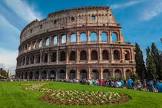The Importance of Embracing and Preserving Historical Sites
History serves as a vital link to our past, providing us with valuable insights into the events, people, and cultures that have shaped our world. Historical sites are tangible reminders of our collective heritage, offering a glimpse into bygone eras and allowing us to connect with the stories of those who came before us.
Preserving Cultural Identity
Historical sites play a crucial role in preserving our cultural identity. They serve as physical representations of the traditions, beliefs, and achievements of previous generations, helping us understand where we come from and who we are today. By safeguarding these sites, we ensure that future generations can continue to learn from and appreciate the rich tapestry of human history.
Educational Opportunities
Visiting historical sites provides unique educational opportunities for people of all ages. Whether exploring ancient ruins, touring historic homes, or walking through museums, these experiences offer firsthand encounters with the past. By engaging with historical artifacts and narratives, individuals gain a deeper understanding of different time periods and societies.
Promoting Cultural Tourism
Historical sites also play a significant role in promoting cultural tourism. Travelers from around the world are drawn to destinations with rich historical significance, seeking to immerse themselves in the stories and heritage of different regions. By preserving and showcasing historical sites, communities can attract visitors, stimulate economic growth, and foster appreciation for their unique cultural heritage.
Connecting Communities
Historical sites have the power to bring communities together by providing shared spaces for reflection, celebration, and dialogue. Events held at historical landmarks often serve as focal points for community gatherings, fostering a sense of unity among residents. By valuing and maintaining these sites, communities can strengthen their bonds and create lasting connections across generations.
Conclusion
Embracing and preserving historical sites is essential for honoring our past, enriching our present, and shaping our future. These invaluable landmarks serve as touchstones for our collective memory and identity, reminding us of where we’ve been and inspiring us to chart a course forward with wisdom gained from history’s lessons. Let us cherish and protect these treasures for generations to come.
Understanding Historical Terms: Answers to Commonly Asked Questions
- What does it mean to be historical?
- What is example of historical?
- What is the difference historic and historical?
- How do you describe something historic?
- What’s another word for historical?
- What is a word that means historical?
What does it mean to be historical?
To be historical means to have significance or relevance in relation to the past. Something that is considered historical is typically associated with a specific time period, event, or cultural context that holds importance in understanding the development of society or a particular subject. Being historical often implies that an object, place, or concept has endured through time and carries with it a sense of tradition, heritage, or legacy that contributes to our collective understanding of history.
What is example of historical?
An example of something historical could be a preserved ancient artifact, such as a Roman coin unearthed at an archaeological site. This tangible object serves as a direct link to a specific time period in history, offering valuable insights into the economic, cultural, and artistic practices of the ancient Roman civilization. By studying and preserving such historical artifacts, we can gain a deeper understanding of the past and appreciate the significance of our shared human heritage.
What is the difference historic and historical?
The difference between “historic” and “historical” lies in their usage and connotations. “Historic” refers to something significant or important in history, often associated with momentous events or milestones. For example, a historic building may have played a crucial role in shaping a community’s identity. On the other hand, “historical” pertains to anything related to history or the past, without necessarily carrying the same weight of importance as something deemed “historic.” It is used more broadly to describe events, figures, or objects that have historical significance but may not be considered pivotal moments in history. Understanding this distinction can help convey nuances in meaning when discussing matters of the past.
How do you describe something historic?
When describing something as historic, it typically refers to an event, place, object, or person that holds significant importance or relevance in history. The term “historic” is used to denote something that has had a lasting impact, influenced future developments, or marked a turning point in a particular context. Historical significance can be attributed to factors such as rarity, uniqueness, cultural significance, or the role it played in shaping the course of history. Describing something as historic often involves highlighting its importance within a broader historical narrative and recognizing its enduring legacy in shaping our understanding of the past.
What’s another word for historical?
An alternative term for “historical” is “historic,” which is often used interchangeably to describe events, places, or artifacts of significant importance or relevance in the past. Both terms convey a sense of connection to history and the past, highlighting the enduring significance and impact of certain subjects on our understanding of the world.
What is a word that means historical?
A term synonymous with “historical” is “historic,” which is commonly used to describe events, places, or objects of significant importance or relevance in the past. When something is deemed historic, it signifies that it holds historical significance or has played a pivotal role in shaping the course of history.





